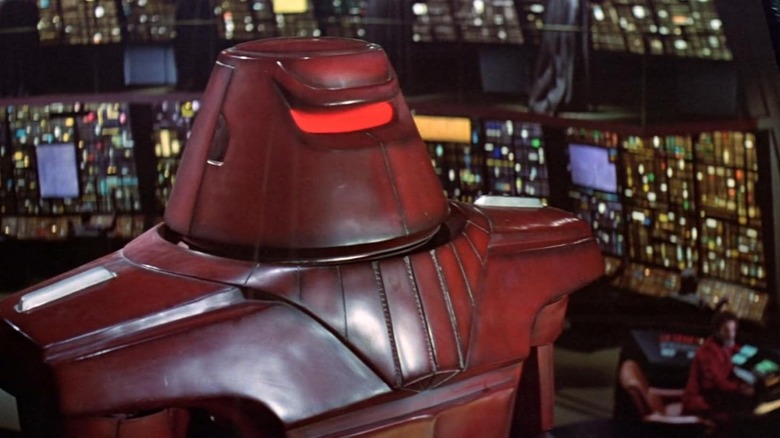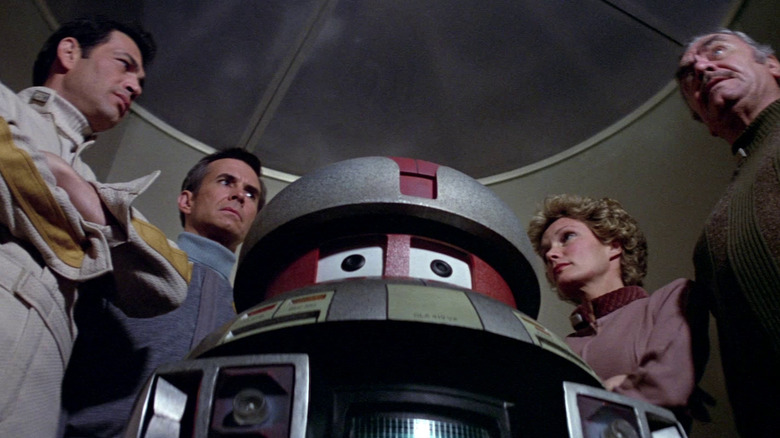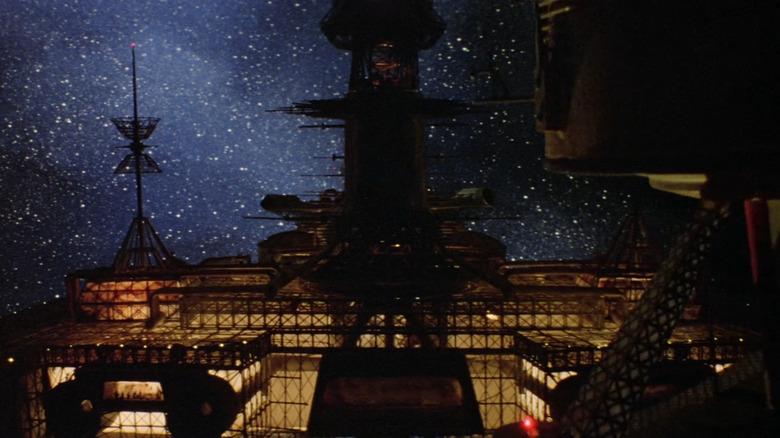This '70s Disney Sci-Fi Film Stars A Horror Icon (And Has A Bizarre Ending)
The live-action films of Disney's so-called "Dark Age" are endlessly fascinating. After its namesake died in 1966, the flailing studio spent the next 20 years (and change) trying to reinvent itself in the lead-up to the Disney Renaissance. Because of this, it began tackling live-action projects that were noticeably more mature and ambitious than its output in decades past. This also answers the riddle of how the hell the same company that gave us zany fare like "The Shaggy Dog" and basically every Disney movie Kurt Russell made in the 1960s and '70s ended up producing something as peculiar and even horrifying as 1979's "The Black Hole."
Directed by Gary Nelson (who also helmed Disney's 1976 take on "Freaky Friday"), "The Black Hole" began as the Mouse House's attempt to catch the wave of lucrative '70s disaster flicks, most notably the Irvin Allen-produced "The Poseidon Adventure" and "The Towering Inferno." However, that version of the sci-fi picture failed to gain traction and ultimately fell by the wayside in early development. It was only after "Jaws" and especially "Star Wars: Episode IV — A New Hope" ushered in the era of the modern blockbuster that Disney decided to give "The Black Hole" another shot.
Far from "'The Poseidon Adventure' in space," the reworked version of "The Black Hole" that actually made it to the screen plays more like a cross between Disney's 1954 "20,000 Leagues Under the Sea" adaptation and its version of Andrei Tarkovsky's "Solaris." The movie itself is as strange as that sounds, complete with the late, great Robert Forster and "Psycho" icon Anthony Perkins leading the cast and an ending that's about as memorably bizarre as they come. Also, famed Western actor and rodeo artist Slim Pickens voices a robot. Like I said before, this one's a head-scratcher.
Disney's The Black Hole is a weird (and cynical) wannabe blockbuster
Renowned "James Bond" composer John Barry sets the majestic yet ominous and foreboding tone for "The Black Hole" with his overture, which plays over a black screen at the start of the film before the opening credits. From there, we follow the USS Palomino — a futuristic spacecraft whose crew includes the stoic Captain Dan Holland (Forster) and mercurial Dr. Alex Durant (Perkins) — as it stumbles upon the USS Cygnus, a long-missing spaceship that can somehow defy the gravitational pull of a nearby black hole. (And that's not even remotely the most scientifically-inaccurate thing that happens in this movie!)
Upon boarding, Holland and his team discover the mysterious vessel is now being run by Dr. Hans Reinhardt (Maximilian Schell), a renowned scientist back on Earth, and his robotic and drone servants, most of whom don't speak and are more than a little sinister. Suffice it to say, things aren't as they seem (which is saying something since they're pretty dang off from the get-go), and the story only gets creepier from there.
Despite being a Disney movie, "The Black Hole" embraces the cynicism of '70s cinema. It depicts those in positions of authority as untrustworthy, power-hungry, and otherwise prone to being corrupted (not least of all the Captain Nemo-esque Reinhardt), culminating in a climax full of bad guys getting their just desserts in ways that are surprisingly grisly without also being graphic. At the same time, it wants to be a crowd-pleasing blockbuster in the vein of "Star Wars," shoehorning in cutesy robots and laser gun shoot-outs into an otherwise unhurried mystery narrative. That is, until the ending, where (without getting too specific) it tries to pull a "2001: A Space Odyssey," but with a baffling twist.
The legacy of Disney's The Black Hole is ... complicated
Is "The Black Hole" a great film? Not exactly. It's a bit of a hodgepodge of elements that feel like they were either left over from earlier iterations of its script or added to make it play more like "Star Wars," and its heroes are too hastily sketched to leave an impression (despite the efforts of its first-rate cast, which also includes Ernest Borgnine and "Planet of the Apes" legend Roddy McDowall as the voice of one of the robots). "The Black Hole" is an interesting movie, though, particularly in the way it attempts to package a cerebral sci-fi story (one with a theological subtext that gradually becomes more and more literal) as a mainstream tentpole.
Combine that with the film's special effects — a triumph of pre-CGI tricks that used then-cutting-edge computer-controlled tech to make the film's miniatures look more realistic and seamlessly blend the cast with the matte painting backdrops — and you can see why folks are still talking about it decades after it failed to impress either critically or financially. You can also count Joseph Kosinski among its biggest fans, which should come as no shock. (Thematically daring, effects-heavy sci-fi movies are kind of the "Tron: Legacy" and "Oblivion" director's bag.) He even worked on a "Black Hole" remake back in the 2010s, at least until "Interstellar" came along and stepped on its toes. That'll probably never come to fruition, but who knows? As the original film shows us, odd things can happen around black holes. (Except, you know, not really, lest I give any astrophysicists out there reading this a splitting headache.)
"The Black Hole" is currently streaming on Disney+.


